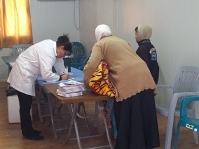 Umm Luai'a, a Ministry of Health nurse, registering young children in Al Zaatari “I am just so happy that my child gets as much help as she can.” Umm Sakher is happy despite the cold wind and splattering of rain. She is happy to be in the WHO compound. Her smile radiates in the cold weather and she even assists in a focus group meeting to show her gratitude.She is not the only one; the WHO caravan in the Al Zaatari refugee camp is visited by many mothers and fathers, all eagerly awaiting the arrival of the immunization nurse. Every Wednesday and Saturday the Ministry of Health with support from UNICEF and WHO organize routine immunizations sessions for under-fives in Al Zaatari.
Umm Luai'a, a Ministry of Health nurse, registering young children in Al Zaatari “I am just so happy that my child gets as much help as she can.” Umm Sakher is happy despite the cold wind and splattering of rain. She is happy to be in the WHO compound. Her smile radiates in the cold weather and she even assists in a focus group meeting to show her gratitude.She is not the only one; the WHO caravan in the Al Zaatari refugee camp is visited by many mothers and fathers, all eagerly awaiting the arrival of the immunization nurse. Every Wednesday and Saturday the Ministry of Health with support from UNICEF and WHO organize routine immunizations sessions for under-fives in Al Zaatari.
These sessions, which are free of charge, are in conjunction with the already established French Field Hospital measles immunization sessions for new arrivals under the age of 15 years that run 6 days per week. Similarly, an immunization campaign was concluded last week in Mafraq and Irbid for all children under the age of five years, both Jordanians and non-Jordanians. This was also supported by UNICEF and WHO. The immunizations supplied at the WHO caravan are initial injections so most beneficiaries are young babies, some only a couple of months old. However some are a lot older.
The problem is garnering all the information” says Umm Luai’a, the immunization nurse for the Ministry of Health. “Some mothers cannot remember what injections their children have had. Some are even three years old and have not had any at all! My job is not only to administer the injections but to also advise the parents; they are scared for their baby’s safety, they just want the best for them”. It is very difficult for the health workers as many mothers do not have the immunization cards from Syria, meaning there is no information on previous immunizations received.
The cries that come out of the caravan are enough to melt even the coldest heart; the concern in each parent’s face as their own baby is pricked with a needle is the epitome of love. However, the crying almost always stops immediately, once the child has been briefly consoled by their parent. In turn the parents' faces change from concern to radiant smiles. For they know their loved ones will be protected from some of the most common and harmful diseases.
“I’ve been giving immunizations to babies for 20 years now and you never get used to the crying” says Umm Luai’a as she tidies away for the day. “But I know that these children will go back with their parents safe from afflictions.”
According to the statistics, the numbers of babies being immunized per session has dropped from an average of 50 per session to an average of 20. But Umm Luai’a puts that down to the lack of promotion in the camp, rather than anything else. “Parents will do anything to protect their child; they know that immunization is for the best. We just need more help promoting it through the camp; this is the challenge we face now”.
As crying babies are consoled by mothers and fathers, brothers and sisters, and are wrapped up tight for the journey back to their tents or caravans, the true value of these sessions shines clearly. The small jab, whose pain can be kissed away by a loving family member, has protected these children from diseases that could have a catastrophic effect on their lives. No amount of wind or rain will keep a loving parent away.







